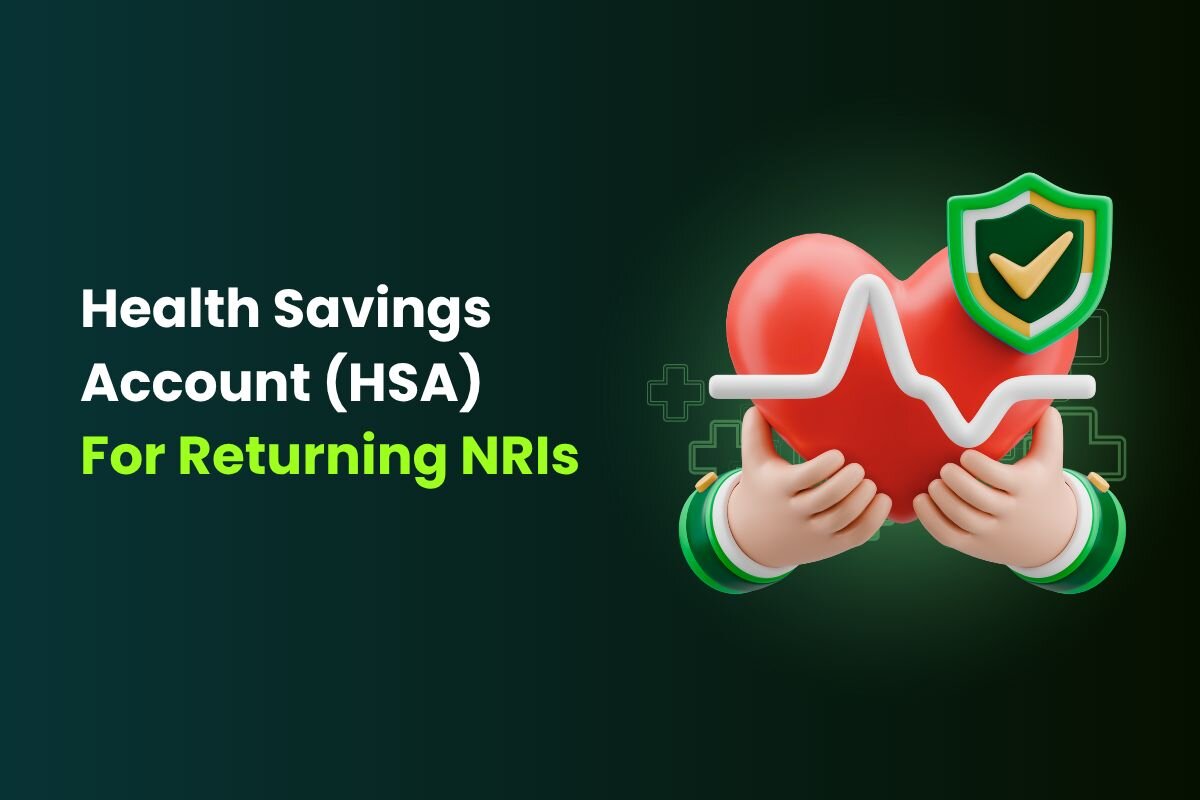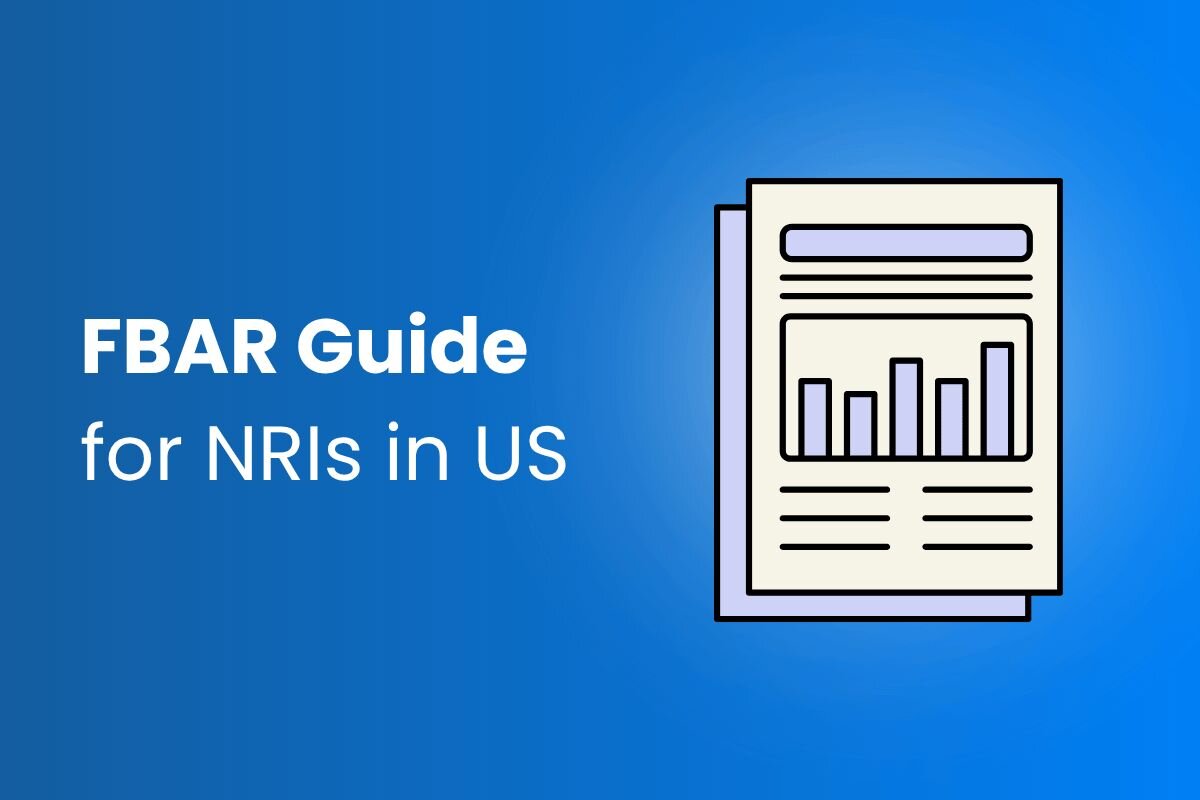If you're planning to move back to India from the US, your Health Savings Account might be sitting there like a financial puzzle you're not sure how to solve. You've enjoyed the amazing tax benefits while working in America, but now you're wondering what happens next.
Here's the thing: your HSA doesn't just disappear when you return to India, but the tax rules change dramatically. Without proper planning, you could face unexpected tax bills and compliance penalties that eat into your hard-earned savings.
Key Takeaway
- You can keep your HSA after returning to India, but you cannot make new contributions once you lose your US high-deductible health plan coverage
- HSA taxation changes completely when you become a Resident and Ordinarily Resident (ROR) in India, with all earnings and withdrawals becoming taxable
- You must report your HSA in Schedule FA of your Indian income tax return to avoid penalties up to Rs. 10 lakhs under the Black Money Act
- Strategic withdrawal timing during your RNOR phase can help you avoid double taxation on your HSA funds
- Unlike 401(k) or IRA accounts, HSAs do not qualify for Section 89A relief in India
- Using HSA funds for medical expenses in India is allowed, but requires meticulous documentation and currency conversion
What is a Health Savings Account (HSA) and How Does it Work?
A Health Savings Account (HSA) is a tax-advantaged savings account available to anyone enrolled in a High Deductible Health Plan (HDHP) in the United States. Think of it as a special account where you can save money specifically for healthcare costs while getting significant tax breaks.
The HSA offers what's called a "triple tax advantage" in the US. First, your contributions are tax-deductible, meaning they reduce your taxable income. Second, any interest, dividends, or investment gains in the account grow completely tax-free. Third, when you withdraw money for qualified medical expenses, you pay zero taxes.
To contribute to an HSA in 2024, your health plan must have a minimum deductible of $1,600 for individual coverage or $3,200 for family coverage. For 2025, these minimums increase slightly to $1,650 and $3,300 respectively.
The contribution limits for 2024 are $4,150 for individuals and $8,300 for families. These limits jump to $4,300 and $8,550 in 2025. If you're 55 or older, you can add an extra $1,000 as a catch-up contribution.
Your HSA money rolls over year after year without expiring. You can even invest it in stocks, mutual funds, and other securities, just like a retirement account. This makes it an incredibly powerful tool for long-term savings while you're living in the US.
Can NRIs Keep Their HSA After Returning to India?
Yes, you can absolutely keep your HSA account after moving back to India. The account doesn't close automatically, and all your existing funds remain accessible to you.
However, there's an important catch. You cannot make new contributions to your HSA once you're no longer covered by a qualifying US high-deductible health plan. Since you'll lose your US employer's HDHP coverage when you return to India, your contribution days are essentially over.
Your HSA provider might charge higher maintenance fees for accounts with foreign addresses. Some providers also create additional hurdles for international account management, like requiring you to call during US business hours or limiting online access. It's worth checking with your provider about their specific policies for account holders living abroad.
The good news is that you can still use your HSA funds for qualified medical expenses, whether those expenses happen in the US or India. The account stays in your name indefinitely, giving you flexibility in how and when you use the money.
How is HSA Taxed in India for Returning NRIs?
This is where things get complicated, and your tax situation depends entirely on your residential status in India. The treatment is vastly different during your initial years back versus later.
During NRI or RNOR Status
When you first return to India, you typically qualify as either a Non-Resident Indian (NRI) or a Resident but Not Ordinarily Resident (RNOR). During this phase, your HSA receives favorable treatment. Your HSA earnings remain completely tax-free in India, and you don't need to report the account in your Indian income tax return.
This RNOR status usually lasts for a couple of years after your return, depending on your specific situation. During this golden window, withdrawals for medical expenses remain tax-free in the US, and India doesn't tax them either.
After Becoming Resident and Ordinarily Resident (ROR)
Everything changes once you become a Resident and Ordinarily Resident (ROR) for Indian tax purposes. India starts taxing your worldwide income, and your HSA is no exception.
All interest, dividends, and capital gains earned in your HSA become taxable in India according to your income tax slab. Even more surprising to most people: withdrawals are taxed as regular income in India, even if you're taking the money out for legitimate medical expenses.
Let's say your HSA balance grows by $5,000 in one year through investment returns. If you're in the 30% tax bracket in India, you'll owe approximately Rs. 1,25,000 in taxes on that growth (assuming an exchange rate of 83 rupees per dollar), even if you don't withdraw a single rupee.
Here's what makes HSAs particularly tricky: they don't qualify for Section 89A relief. This is a special provision that helps returning NRIs manage taxation on retirement accounts like 401(k)s and IRAs. Unfortunately, HSAs aren't included in this relief, making them fully taxable in India without any special considerations.
The India-US tax treaty (DTAA) doesn't provide favorable treatment for HSAs either. While the treaty helps prevent double taxation on many types of income, HSAs fall into a gray area that often results in less favorable outcomes for returning NRIs.
What Are the Reporting Requirements for HSA in India?
Once you become a resident for tax purposes in India, you must report your HSA account in your income tax return. This isn't optional, it's mandatory under Indian law.
You'll need to disclose your HSA in Schedule FA (Foreign Assets) of your ITR. This schedule requires you to provide details about the account, including the name of the financial institution, account number, peak balance during the year, and closing balance.
The Black Money (Undisclosed Foreign Income and Assets) and Imposition of Tax Act, 2015 takes non-disclosure very seriously. If you fail to report your HSA or any other foreign asset, you could face penalties up to Rs. 10 lakhs. That's not a typo, the penalty can reach seven figures.
Beyond the immediate penalty, non-disclosure can also cost you the right to claim benefits under the Double Taxation Avoidance Agreement. This means you might end up paying taxes on the same income in both countries without any relief mechanism.
When filing your NRI tax return, make sure you include all relevant information about your HSA. Keep records of your account statements, contribution history, and withdrawal details. These documents will be crucial if the tax authorities ever have questions.
Can You Use Your HSA for Medical Expenses in India?
Yes, you can use your HSA funds to pay for qualified medical expenses in India. According to IRS Publication 969, the definition of qualified medical expenses is location-independent, meaning it doesn't matter where you receive the care.
However, using your HSA for Indian medical expenses requires careful documentation. You must keep detailed, itemized bills from your doctor, clinic, or hospital. Generic receipts won't cut it, you need bills that clearly show what services were provided and when.
You'll also need proof of payment, like bank statements or credit card receipts showing the transaction. Here's a crucial detail: you must convert all expenses from Indian rupees to US dollars using the exchange rate on the date the service was paid for or incurred. This conversion is necessary for your US tax records.
Keep all these documents organized and accessible. If the IRS ever audits your HSA withdrawals, you'll need to prove that every dollar was spent on legitimate qualified medical expenses. Missing documentation could result in those withdrawals being treated as taxable income plus a 20% penalty if you're under 65.
One important limitation: you can only use HSA funds for your own medical expenses, your spouse's expenses, or expenses for anyone you can claim as a dependent on your US tax return. In most cases, your parents living in India wouldn't qualify as US tax dependents, so you cannot use HSA funds for their medical care.
What Are the Best Strategies for Managing Your HSA When Returning to India?
The key to managing your HSA effectively is timing your decisions based on your residential status and future plans. Here are the most effective strategies.
Strategy 1: Maximize Use Before Becoming ROR
The smartest move for many returning NRIs is to use their HSA funds strategically before becoming a Resident and Ordinarily Resident in India. This is the time to front-load any medical procedures you or your family might need.
Consider scheduling dental work, LASIK eye surgery, or other elective procedures while you're still in the US or during your RNOR phase. For example, if you've been thinking about getting LASIK, which typically costs $4,000 to $5,000, using your HSA for this expense saves you from paying income tax on that withdrawal later.
Let's say you have $20,000 in your HSA and you're about to become ROR in India. If you withdraw that entire amount for qualified medical expenses during your RNOR phase, you pay zero tax in both countries. If you wait until after becoming ROR and are in the 30% tax bracket, you'll pay about Rs. 5,00,000 in taxes on that same withdrawal.
Strategy 2: Strategic Withdrawal During RNOR Phase
If you don't have immediate medical expenses, consider withdrawing funds during your RNOR years anyway. Yes, you'll pay the 20% early withdrawal penalty in the US if you're under 65, but you'll avoid Indian taxation completely.
Here's the math: a 20% penalty on a $20,000 withdrawal means you lose $4,000. But if you wait until you're ROR in India and in the 30% tax bracket, you could pay $6,000 or more in Indian taxes. The penalty might actually be the cheaper option.
This strategy makes most sense for non-US citizens who won't continue paying US taxes after moving to India. For US citizens, you'll pay taxes in both countries regardless, so the calculation becomes more nuanced.
Strategy 3: Keep Account for Age 65 and Beyond
If you're close to 65 years old, holding onto your HSA might make sense. Once you turn 65, the 20% early withdrawal penalty disappears. You can withdraw money for any reason, though it will be taxed as regular income, similar to a 401(k).
For someone who's 62 and returning to India, waiting three years before withdrawing could save thousands of dollars in penalties. Of course, you'll still pay income tax on the withdrawals in both the US (if you're a citizen) and India, but avoiding the 20% penalty is significant.
This strategy works well if you have other funds to cover your immediate expenses in India and can afford to let the HSA sit for a few years. Your retirement planning should factor in these HSA funds as part of your overall financial picture.
Strategy 4: Minimal Growth Investment Approach
If you decide to keep your HSA while living in India, consider switching your investments to low-growth options. Since all investment gains are taxable in India once you're ROR, keeping your money in stable, low-return investments reduces your annual tax liability.
For instance, if your HSA is currently invested in aggressive growth stocks, consider moving to a money market fund or stable value fund. While this sacrifices potential returns, it also minimizes the taxable income you'll report each year in India.
This approach makes sense if you plan to use the HSA for future medical expenses during US visits or if you're maintaining it as an emergency fund for healthcare needs.
What Happens if You Continue Contributing to HSA After Losing HDHP Coverage?
This is a common mistake that can lead to serious tax problems. Once you leave your US job and lose your HDHP coverage, you must stop contributing to your HSA immediately.
If you accidentally make contributions after losing eligibility, the IRS treats those as excess contributions. You'll face a 6% excise tax on the excess amount for every year it remains in your account. This tax compounds annually until you remove the excess contributions.
Let's say you contribute $2,000 after losing your HDHP coverage and don't realize your mistake for three years. You'll owe $120 in excise tax for the first year, another $120 for the second year, and $120 for the third year, totaling $360 in penalties.
To fix excess contributions, you need to withdraw them before filing your tax return for that year. The withdrawal must include any earnings attributable to those excess contributions. It's a paperwork hassle, so the best approach is to stop contributions as soon as your HDHP coverage ends.
Should You Close Your HSA Before Returning to India?
Whether to keep or close your HSA depends on several personal factors. There's no one-size-fits-all answer, but here's a framework to help you decide.
Keep your HSA open if you're a US citizen who will continue filing US taxes indefinitely. The tax treatment is similar whether you're in the US or India, and having the funds available for future medical expenses provides flexibility. Also keep it if you're close to 65 and can wait out the penalty-free withdrawal age.
Consider closing your HSA (by withdrawing all funds) if you're a non-US citizen who can sever US tax obligations completely. Also consider this if you have a large balance and are about to become ROR, as withdrawing during your RNOR phase avoids Indian taxation.
Think about your account balance too. If you have $50,000 in your HSA, the tax implications are significant. If you have $3,000, the administrative hassle of maintaining the account might outweigh the benefits.
Your age matters considerably. If you're 60 years old, waiting five years to withdraw penalty-free might be worthwhile. If you're 35, that's 30 years of potential tax complications in India for an account that loses most of its US tax advantages.
What Are the Alternatives to HSA for Healthcare in India?
Once you return to India, you'll need proper health coverage since your US insurance won't work here. India has excellent healthcare options at a fraction of US costs.
Consider buying a comprehensive health insurance policy from an Indian provider. A good family floater plan with Rs. 50 lakh coverage typically costs Rs. 25,000 to Rs. 40,000 annually, far less than US premiums. You can also add a super top-up policy for additional coverage at minimal cost.
Many returning NRIs maintain their HSA as an emergency fund but rely on Indian health insurance for day-to-day medical needs. This dual approach gives you coverage in India while keeping a financial cushion for future US medical expenses or emergencies.
Another smart move is building a separate emergency medical fund in rupees. Having Rs. 5 to 10 lakhs easily accessible ensures you can handle unexpected healthcare costs without worrying about HSA documentation requirements or tax implications.
How Does HSA Treatment Differ for US Citizens vs Non-Citizens Returning to India?
US citizens face a more complex situation because they must file US tax returns and pay taxes on worldwide income regardless of where they live. This means your HSA will be taxed in both the US and India once you become ROR.
For US citizens, the HSA often continues functioning similarly to how it did in America, except you also have Indian tax obligations. You might be able to claim foreign tax credits to reduce double taxation, but the paperwork becomes significantly more complicated.
Non-citizens have more flexibility. Once you return to India and are no longer a US resident for tax purposes, you can potentially close out your US financial affairs entirely. This makes strategic withdrawal during your RNOR phase particularly attractive since you can avoid future Indian taxation without ongoing US tax obligations.
The decision on how to manage your HSA should factor heavily into your financial planning as an NRI in the USA before you make the move back. Getting professional advice from cross-border tax specialists is money well spent.
What Are Common Mistakes NRIs Make with Their HSA?
Many returning NRIs assume their HSA will continue receiving the same tax treatment in India as it did in the US. This misconception leads to surprise tax bills when they become ROR and realize all their HSA earnings are taxable.
Another frequent mistake is failing to report the HSA in Schedule FA of the Indian income tax return. Some people think that since they're not withdrawing money, they don't need to report it. The Black Money Act doesn't care whether you're making withdrawals, you must report all foreign assets.
Poor documentation for Indian medical expenses is another common problem. People use their HSA debit card for medical care in India but don't keep itemized bills or currency conversion records. Years later, if the IRS questions these withdrawals, they have no proof the expenses were qualified.
Many NRIs also ignore the residential status transition timing. They wait too long to withdraw funds and miss the RNOR window, resulting in unnecessary taxation. Planning your return to India should include a clear HSA strategy.
Finally, some people continue making automatic payroll contributions after leaving their US job, not realizing their HDHP coverage has ended. These excess contributions trigger penalties that compound over time.
HSA vs 401(k) and IRA: How Does Tax Treatment Differ for Returning NRIs?
This is a crucial distinction that catches many people off guard. Retirement accounts like 401(k)s and IRAs receive much better tax treatment in India than HSAs do.
Section 89A of the Income Tax Act provides special relief for taxation of retirement accounts. This provision allows spreading the tax liability over multiple years and provides other benefits that make retirement account taxation more manageable for returning NRIs.
HSAs don't qualify for Section 89A relief. The government treats them as regular foreign assets, subjecting all earnings and withdrawals to full taxation without any special considerations.
This difference significantly impacts your financial planning. If you're deciding whether to maximize contributions to your 401(k) or your HSA before returning to India, the 401(k) is generally the better choice from an Indian tax perspective.
Understanding these differences helps you prioritize which accounts to focus on while you're still in the US and which accounts to draw down first when you return to India.
Conclusion
Your Health Savings Account is a fantastic financial tool while you're working in the United States, but it requires careful planning when you return to India. The tax rules change dramatically based on your residential status, and without proper strategy, you could face unexpected tax bills and compliance penalties.
The key is understanding your timeline and making smart decisions during your RNOR phase. Whether you choose to withdraw funds strategically, use them for front-loaded medical expenses, or maintain the account for future needs depends on your personal situation, age, citizenship status, and financial goals. Whatever you decide, make sure you're reporting the account properly in your Indian tax returns to avoid severe penalties under the Black Money Act. Consider consulting with cross-border tax professionals who understand both US and Indian taxation to create a personalized strategy that maximizes your savings and minimizes your tax liability.
Frequently Asked Questions
Can I keep my HSA after moving back to India?
Yes, you can keep your HSA account after returning to India. The account remains open and all your funds stay accessible. However, you cannot make new contributions once you lose your US high-deductible health plan coverage. Some HSA providers may charge higher fees for foreign addresses or create additional account management requirements.
Will I have to pay taxes on my HSA in India?
Your HSA tax treatment in India depends on your residential status. During your NRI or RNOR phase, HSA earnings remain tax-free in India and don't need to be reported. Once you become a Resident and Ordinarily Resident (ROR), all HSA earnings including interest, dividends, and capital gains become taxable. Withdrawals are also taxed as regular income, even for medical expenses.
How do I report my HSA in my Indian income tax return?
You must report your HSA in Schedule FA (Foreign Assets) of your Indian ITR once you become a resident for tax purposes. Include details like the financial institution name, account number, peak balance during the year, and closing balance. You'll also need to report any earnings from the HSA as foreign income. Failure to report can result in penalties up to Rs. 10 lakhs under the Black Money Act.
Can I use my HSA to pay for medical treatment in India?
Yes, you can use HSA funds for qualified medical expenses in India. The IRS considers qualified medical expenses to be location-independent. However, you must maintain detailed itemized bills, proof of payment, and convert all expenses from rupees to dollars using the exchange rate on the date of service. This documentation is crucial for IRS compliance.
What happens if I don't report my HSA in India?
Not reporting your HSA can lead to severe consequences under the Black Money Act, 2015. You could face penalties up to Rs. 10 lakhs for non-disclosure of foreign assets. Additionally, you might lose the right to claim benefits under the India-US tax treaty (DTAA), potentially resulting in double taxation on your income without any relief mechanism.
Should I withdraw all my HSA funds before becoming ROR?
Withdrawing funds during your RNOR phase can be a smart strategy since those withdrawals won't be taxed in India. However, if you're under 65, you'll face a 20% early withdrawal penalty in the US for non-medical withdrawals. Compare this penalty against the potential Indian tax liability (which could be 30% or more) to determine the best approach for your situation.
Can I contribute to my HSA after returning to India?
No, you cannot contribute to your HSA after returning to India unless you maintain a qualifying US high-deductible health plan. Since you'll lose your US employer's HDHP coverage when you move back, your ability to make contributions ends. Making contributions without HDHP coverage results in excess contribution penalties of 6% annually.
Is there Section 89A relief for HSA like 401(k)?
No, HSAs do not qualify for Section 89A relief in India. This special provision helps returning NRIs manage taxation on retirement accounts like 401(k)s and IRAs, but HSAs are excluded. This makes HSAs fully taxable in India without any special considerations or spreading of tax liability over multiple years.
What documents do I need to use HSA for Indian medical expenses?
You need detailed itemized bills from your healthcare provider showing the specific services rendered, proof of payment such as bank statements or receipts, and currency conversion documentation showing the rupee amount converted to US dollars based on the exchange rate on the date of service. Keep all original documents and organize them carefully for potential IRS audits.
At what age can I withdraw from HSA without penalty?
You can withdraw funds from your HSA for any reason without the 20% early withdrawal penalty once you turn 65 years old. However, non-medical withdrawals will still be taxed as regular income in both the US (if you're a citizen) and India (once you're ROR). Medical expense withdrawals remain tax-free in the US at any age, though they become taxable in India once you're ROR.
About the Author

By Prakash
CEO & Founder of InvestMates
Prakash is the CEO & Founder of InvestMates, a digital wealth management platform built for the global Indian community. With leadership experience at Microsoft, HCL, and Accenture across multiple countries, he witnessed firsthand challenges of managing cross-border wealth. Drawing from his expertise in engineering, product management, and business leadership, Prakash founded InvestMates to democratize financial planning and make professional wealth management accessible, affordable, and transparent for every global Indian.




